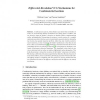Free Online Productivity Tools
i2Speak
i2Symbol
i2OCR
iTex2Img
iWeb2Print
iWeb2Shot
i2Type
iPdf2Split
iPdf2Merge
i2Bopomofo
i2Arabic
i2Style
i2Image
i2PDF
iLatex2Rtf
Sci2ools
SIGECOM
2003
ACM
2003
ACM
Differential-revelation VCG mechanisms for combinatorial auctions
Combinatorial auctions, where bidders can submit bids on bundles of items, are economically efficient mechanisms for selling items to bidders, and are attractive when the bidders’ valuations on bundles exhibit complementarity and/or substitutability. Determining the winners in such auctions is a complex optimization problem that has received considerable research attention during the last 4 years. An equally important problem, which has only recently started to receive attention, is that of eliciting the bidders’ preferences so that they do not have to bid on all combinations [6,8]. Preference elicitation has been shown to be remarkably effective in reducing revelation [13]. In this paper we introduce a new family of preference elicitation algorithms. The algorithms in this family do not rely on absolute bids, but rather on relative (differential) value information. This holds the promise to reduce the revelation of the bidders’ valuations even further. We develop a differential...
Bundles Exhibit Complementarity | Preference Elicitation | Preference Elicitation Algorithms | SIGECOM 2003 |
| Added | 05 Jul 2010 |
| Updated | 05 Jul 2010 |
| Type | Conference |
| Year | 2003 |
| Where | SIGECOM |
| Authors | Wolfram Conen, Tuomas Sandholm |
Comments (0)

